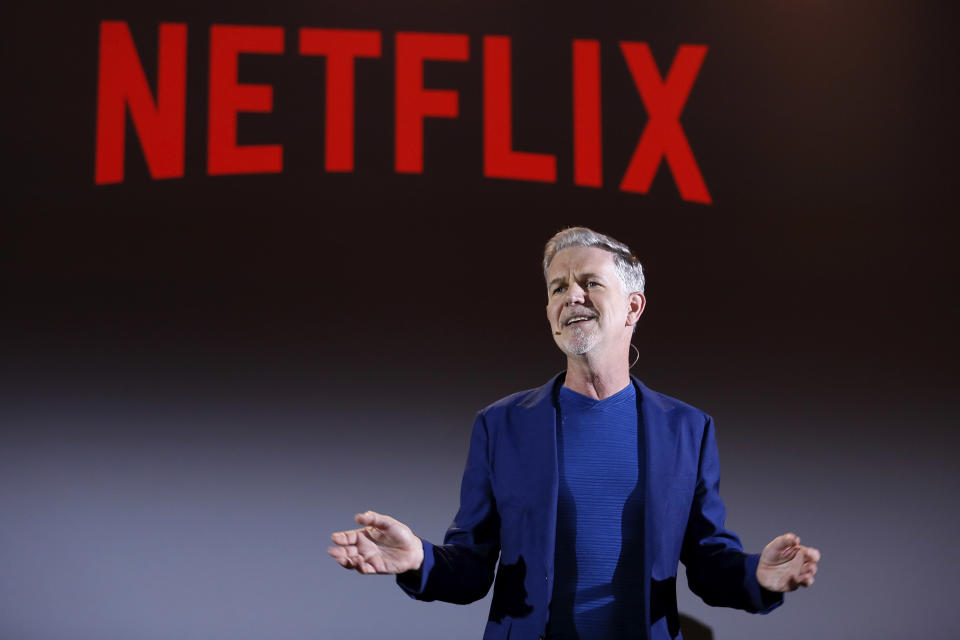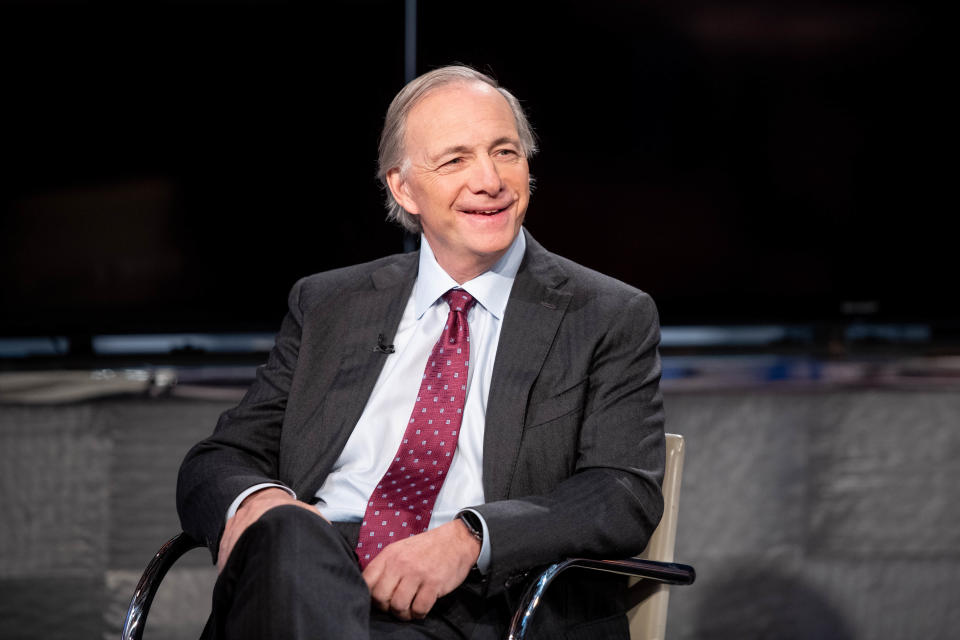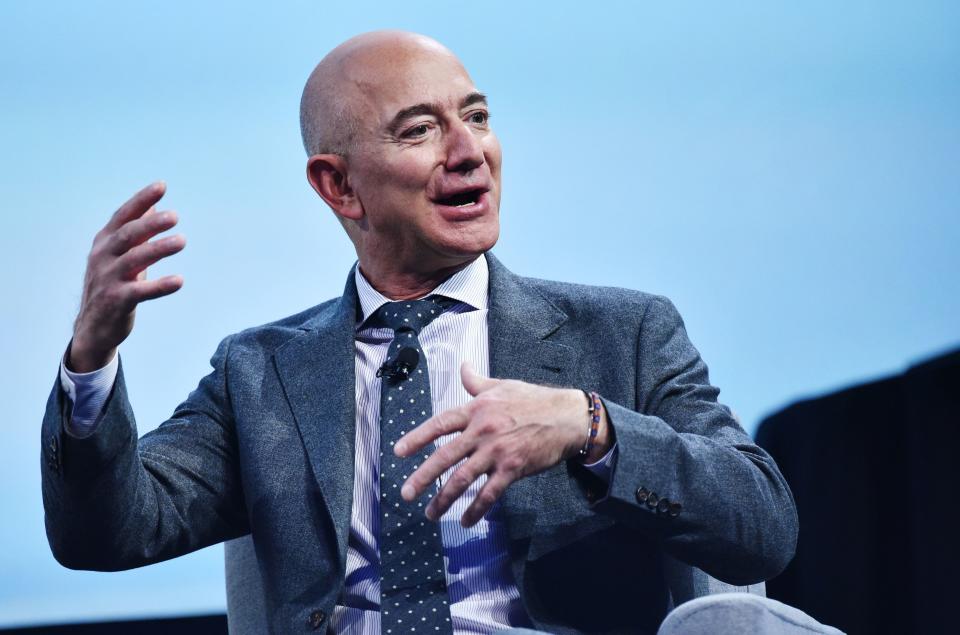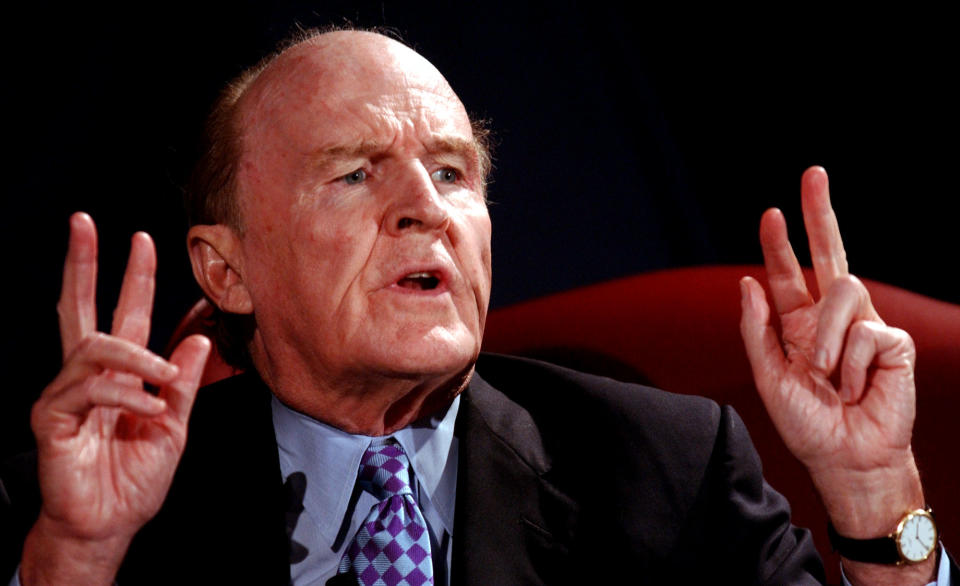What you can learn from Jeff Bezos, Ray Dalio and Reed Hastings
I’ve never understood the fascination with self help and business books, especially the ‘how to create a great company and grow your career’ kind of stuff. They kind of remind me of the cookbook “365 Ways to Cook Chicken.” Is there really anything new to say? To me it’s mostly a deadly-dull, exercise in the obvious. (On the other hand maybe that’s why I’m insensitive, dysfunctional and not that successful.)
There must be something to these books though, because every year millions of people buy them by the truckload. Despite the overwhelming popularity of Trump-related tomes (pro and con) on Amazon’s bestseller list right now, and you’ll still find the likes of “Think Like a Monk,” by Jay Shetty, “The Four Agreements,” by Don Migeul Ruiz and another one titled, “No Rules Rules.”
You may have noticed that last one, co-authored by Reed Hastings, co-founder and co-CEO of Netflix (NFLX), (apparently he’s good at collaborating), which made a big splash debuting this past week. And I have to admit, in the case of Hastings' book, it’s a bit easy to understand the fuss.
Netflix has been one of the most successful companies on the planet over the past two decades, turning Hollywood on its ear, delighting its nearly 200 million global customers, and greatly enriching shareholders. Famously one of the FAANGs with a market capitalization of more than $200 billion, Netflix is a both a stock of our time and a nearly ubiquitous service ingrained in today’s popular culture it’s helping to create. (Netflix and chill anyone?) That’s powerful and intriguing.
So yes, people want to hear what Hastings has to say, including me, which is why I did my Influencers interview with him this week, (which I get into a bit below.)
To my mind Hastings is one of three business leaders who are of primary interest these days. Leaving aside the gold standard, Warren Buffett, (whose wisdom is the subject of dozens of books), I think Hastings, along with Jeff Bezos, and a less likely cohort, hedge fund mogul Ray Dalio, are the business leader-management gurus of the moment. (Apologies here to JPMorgan Chase CEO Jamie Dimon, Blackstone CEO Steve Schwarzman, and others.)
Before we explore the similarities and differences in management philosophies, I should point out that Bezos, Dalio and Hastings have a number of personal commonalities. They are late middle-aged business leaders who came from upper middle class (Hastings) or middle class backgrounds. They studied STEM and finance at elite schools. All three are mavericks and iconoclasts, which of course comes with the territory, mostly working at one company (their own.) And they are all billionaires, with Bezos being the richest person in the world.
(Before I delve into Hastings, Dalio and Bezos more deeply, I should acknowledge the obvious point that all three are white males—along with the aforementioned Buffett, Dimon and Schwarzman—which is particularly glaring given the historic announcement made by Citigroup this week that Jane Fraser will become the bank’s next CEO and as such the first woman to lead a major Wall Street firm. At some point soon I would hope there will be more female and diverse leaders whose successes people will want to understand and learn from.)
Reed Hastings: ‘Adequate performance gets a generous severance package’
Hastings who’ll turn 60 next month has been known for his management acumen for some time. A Bowdoin graduate, Hastings worked in the Peace Corps and has an MBA from Stanford. He first founded Pure Software which was a pretty big success, though not quite as much as Hastings had hoped. After the company’s sale, Hastings and fellow Pure alum, Marc Randolph, founded Netflix in 1997. (The two apparently disagree about the ‘Eureka’ moment on the genesis of Netflix.)
Hastings codified his management ideas into 125-page “Netflix Culture Deck,” initially created for internal use only. But word got out and Hastings, a transparency kind of guy, figured why not put it on the Web, which he did in 2009. Sheryl Sandberg for one said the deck “may well be the most important document ever to come out of Silicon Valley.” Now, 19 million views later, Hastings has taken the deck, plus a lot more and gone book.

What are some of Hastings’ rules? Two of the most famous slides in the deck are: (Slide 23) “Unlike many companies we practice: adequate performance gets a generous severance package.” And, (Slide 27) “The Keeper Test Managers Use: Which of my people, if they told me they were leaving, for a similar job at a peer company, would I fight to keep at Netflix?
Meaning for people who work at Netflix, if at any point a better candidate comes along, the employee is shown the door—graciously, generously and with dignity—but the door nonetheless. Hastings demoted his co-founder Marc Randolph from CEO to president via a 1-1 Powerpoint presentation. And Maureen Dowd, who gave Hastings the full Dowd treatment this week, tells how Hastings “canned one of his best friends and original employees, Patty McCord, who helped create the Culture Deck and who drove to work with him, from her H.R. job.”
Netflix practices elevated transparency when it comes to communication amongst his employees. Talking about others is discouraged. There’s no vacation policy, just perform. And Netflix conducts live 360 degree employee assessments, which produces a certain amount of anxiety, no doubt.
(Full disclosure: I went to college with Reed though we barely knew each other. I’ve been in touch with him a bit over the years and we have some mutual friends who say he’s still the same old Reed; low key with few pretensions, and as they say in Maine, wicked smart.)
Here’s a part of my conversation with him about the culture at Netflix:
RH: We really focus on assembling a great group of people who love working together and are super talented like a professional sports team, to stimulate creativity to be able to come up with the best ideas, both for the user interface, for the service and for the content. We want to have a group of people together that are very thoughtful and creative.
AS: And does it create a work environment that is too difficult for some people?
RH: You definitely hear some of those stories. Netflix is not for everyone. Netflix is for people who are learning machines. They just love absorbing new ideas and new experiences and are willing to make mistakes to figure things out. And it's that kind of self motivated learners that do so well at Netflix.
In other words be a self motivated learner or be gone.
Ray Dalio: ‘Be willing to ‘shoot the people you love‘
Ray Dalio, 71, on the other hand, a quirky mix of gut-instinct Wall Street trader and big-picture thinker, runs Bridgewater Associates, in Westport, Conn., the biggest hedge fund in the world with some $150 billion under management.
Dalio, a Harvard MBA, doesn't suffer from an inferiority complex. I remember traveling to China eight years ago with a group of CEOs and meeting with senior Chinese leaders along with Dalio, who started the conversation off by saying, “My name is Ray Dalio and I run the biggest hedge fund in the world. Here’s my take on what’s going on with China.”
Bridgewater is famous for its singular culture, namely what Dalio calls “radical transparency” (that word again) whereby everyone is tasked with being brutally honest with each other. Like Netflix, talking behind others' backs is verboten. New employees are given a 100-page treatise called “Principles,” which lays out how to behave at the firm. (Writer Kevin Roose described them “as if Ayn Rand and Deepak Chopra had collaborated on a line of fortune cookies…”)
Employees are reportedly required to know and live by these 200 or so principles, which according to this comprehensive 2011 New Yorker profile by John Cassidy include “...look for people who sparkle”; “Be willing to ‘shoot the people you love’” And “Constantly worry about what you are missing,” along with, “There is nothing to fear from truth.” Three years ago, Dalio expanded Principles into a book, titled, yes, “Principles” which became a New York Times best-seller.

According to the New York Times: “Each day, employees are tested and graded on their knowledge of the Principles. They walk around with iPads loaded with the rules and an interactive rating system called “dots” to evaluate peers and supervisors. The ratings feed into each employee’s permanent record, called the ‘baseball card.’” The firm also records and videotapes all manner of meetings. Bridgewater acknowledges the culture is strong brew and not for everyone. “Turnover is high — a third of employees are said to leave within the first two years, a figure the firm does not dispute,” the Times notes.
Speaking of turnover, Cassidy’s article quotes a now former employee, then a member of the firm’s management committee, James Comey (yes that James Comey) who said of Dalio: “He’s tough and he’s demanding and sometimes he talks too much, but, God, is he a smart bastard.”
And there’s Eileen Murray, also then on the management committee, who went on to become co-CEO of the firm. She told Cassidy, “I have never seen a C.E.O. spend as much time developing his people as Ray.” But this April, Murray stepped down as co-CEO and later filed a lawsuit alleging gender discrimination, unequal pay, and breach of contract against Bridgewater regarding her exit package.
Yesterday the Wall Street Journal reported another senior woman executive is “sparring with the firm over her pay after learning that she has earned less than some male counterparts.” Bridgewater denied pay inequity in the latter case and said with regard to Murray’s situation: “We will continue to resolve this matter through the mutually agreed path rather than in the media.”
Still, Bridgewater is a juggernaut, and top students from the best schools flood the firm with job applications.
Dalio who once eschewed the media, has recently adopted a much more public, dare I say transparent persona, and seems keen on sharing his wisdom; doing interviews, podcasts and YouTube videos and another book as well.
Jeff Bezos: ‘Some decisions are consequential and irreversible’
If you search for Jeff Bezos books on Amazon (AMZN) (consider that for a minute), you find a growing library of wisdom from Chairman Jeff. And like Dalio and Hastings it makes sense that people want to understand Bezos’ thinking. Unlike Hastings and Dalio though, Bezos hasn’t written a book. Instead, Bezos’ preferred method of communication is his annual letter to shareholders. (This collection of Bezos’ writings “Invent and Wander,” coming out in November could be worth picking up.)
Bezos, a 56-year-old Princetonian, founded his online bookstore in 1994, went public three years later and has been writing his letters ever since. Amazon’s rise has been meteoric. Now with $281 billion in sales, it’s the second largest company in the U.S. behind arch-rival Walmart ($523 billion in sales), with a market value of $1.6 trillion. Bezos is far-and-away the richest man in the world, with a fortune of $187 billion, $65 billion more than #2 Bill Gates. Bezos is also now divorced, buff, with a new girlfriend—and loathed by the president of the United States.
More to the point, Bezos is known for thinking different, a point he made from the very beginning. Meetings begin with the silent reading of a memo. For years he’s eschewed profits and reinvested in the business even as Wall Street screamed for money. “Because of our emphasis on the long term, we may make decisions and weigh tradeoffs differently than some companies,” he wrote in 1997.

Not only do his letters make for great reading, they allow you to see how his thinking has evolved and matured. Consider this nugget from the 2015 letter.
“Some decisions are consequential and irreversible or nearly irreversible – one-way doors – and these decisions must be made methodically, carefully, slowly, with great deliberation and consultation. If you walk through and don’t like what you see on the other side, you can’t get back to where you were before. We can call these Type 1 decisions. But most decisions aren’t like that — they are changeable, reversible – they’re two-way doors. If you’ve made a suboptimal Type 2 decision, you don’t have to live with the consequences for that long. You can reopen the door and go back through. Type 2 decisions can and should be made quickly by high judgment individuals or small groups.”
Like Bridgewater and Netflix, Amazon has a notoriously high-performance work environment. This too Bezos signaled early on, writing in his 1998 letter:
“During our hiring meetings, we ask people to consider three questions before making a decision:
• Will you admire this person? If you think about the people you’ve admired in your life, they are probably people you’ve been able to learn from or take an example from. For myself, I’ve always tried hard to work only with people I admire, and I encourage folks here to be just as demanding. Life is definitely too short to do otherwise.
• Will this person raise the average level of effectiveness of the group they’re entering? We want to fight entropy. The bar has to continuously go up. I ask people to visualize the company 5 years from now. At that point, each of us should look around and say, “The standards are so high now -- boy, I’m glad I got in when I did!”
• Along what dimension might this person be a superstar? Many people have unique skills, interests, and perspectives that enrich the work environment for all of us. It’s often something that’s not even related to their jobs. One person here is a National Spelling Bee champion (1978, I believe). I suspect it doesn’t help her in her everyday work, but it does make working here more fun if you can occasionally snag her in the hall with a quick challenge: ‘onomatopoeia!’”
An insanely high personnel standard is fine when you’re managing six-figure salaried, Patagonia-vested VPs who’ll land on their feet no matter what. The issue is that unlike Bridgewater and Netflix, Amazon has thousands of hourly workers toiling away in warehouses.
Hastings on Bridgewater and Amazon
I asked Hastings what he thinks about these other two companies:
“It's hard to know, on those companies kind of what the reality is, you know, you can certainly read about, you know, what the, what the leaders think that it is” he said. “And so there's always that question, but I think we're all innovating. And the great thing then is other organizations get to read about Bridgewater, they get to read about Netflix, they get to read about Amazon, and then make their own choices.”
Fair enough.
So how are Bezos, Dalio and Hastings alike and how are they different? Let’s start with the latter: Amazon has a singular meeting protocol, and along with Netflix, an extreme customer focus. Amazon and Bridgewater seem to use digital check ins and even surveillance. Netflix has that no vacation policy. Bridgewater is more overtly rules-based. I’m sure there’s more. As for similarities, those are pretty basic. They all preach transparency and candor. And they have no tolerance for subpar or even average employees.
The way I see it, there are a number of problems attached to these practices as well as being held up as a management guru. First it’s tricky to implement a one-size-fits-all culture universally (see Amazon above and Hastings talks about the challenges to do so globally.) It’s harder still to maintain. Kudos to Messiers Bezos, Dalio and Hastings, who have so far but it won’t last forever. The radical turnover firing bit gets old. People like working in secure environments, they perform well there too.
I’m also not sure how important overt, in your face Culture (with a capital C) is anyway. Costco has been a remarkable company for years. I’m sure it has some sort of work culture, we just don’t hear about it much. Maybe that’s a good thing. Apple certainly attracts and hires really smart people who care a great deal about quality and have high standards. After that, I’m not sure what kind of culture Apple really has. I happen to know Apple, like other companies, has all kinds of politics and bureaucracy. The company still does pretty well.
What it all comes down to
Another potential pitfall with being known for great management and culture is hypocrisy. If you’re going to march out and nail 95 theses to the church door, or in this case put out 200 principles or 125 slides, you damn well better live them.
Jack Welch, the late former CEO of GE, was once held up as the world’s greatest manager. (My former employer, Fortune, named him Manager of the Century in 2000.) He too wrote a number of best-selling management books including “Winning” and “Straight from the Gut.”
Welch made famous the notion of getting rid of the bottom 10% performers of his workforce every year. Thus, he fired tens of thousands of GE employees and along the way earned the moniker ‘Neutron Jack.” Welch also championed a once-vaunted management system called Six Sigma, which helped him create what he called a “boundaryless” organization.
“...a guy came in with a computer and all this statistical analysis, and it was like a dental procedure. But we went with it,” Welch said about Six Sigma to Fortune in July of 2000. That was right about when GE stock hit an all time high—$60 on August 28, 2000. Today GE stock trades for about one-tenth of that, and the company is a shadow of itself. (Welch retired in 2001.)

We now understand that Welch wasn’t all that he was cracked up to be. I should have seen it coming. Twenty years ago or so, I also interviewed Welch and asked him about Six Sigma. “Is it really a big deal at all Jack,” I asked Welch. “Isn’t Six Sigma just the same old stuff every CEO says?” Welch looked at me shocked. “Boy you really are something, Andy,” he said in that familiar rasp of his, shaking his head. “You really are a piece of work.” And then he calmly explained why he thought I was wrong.
Fine, I thought. No big deal. But later that day Welch’s PR guy called me up. “You f--cking s-n of b--ch,” he screamed into the phone. “What the hell was that b-llsh-t you were asking Jack about Six Sigma! You are a total piece of sh-t!”
So much for asking real questions and treating people with dignity and respect.
And really isn’t that what it comes down to? Being smart, treating people right and hiring people who do the same. Now do you see what I mean? I just gave you the whole ball of wax, and you didn’t need to read a whole book to get it.
—
This article was featured in a Saturday edition of the Morning Brief on September 5, 2020. Get the Morning Brief sent directly to your inbox every Monday to Friday by 6:30 a.m. ET. Subscribe
Andy Serwer is editor-in-chief of Yahoo Finance. Follow him on Twitter: @serwer.
Read the latest financial and business news from Yahoo Finance
Read more

 Yahoo Sport
Yahoo Sport 





































